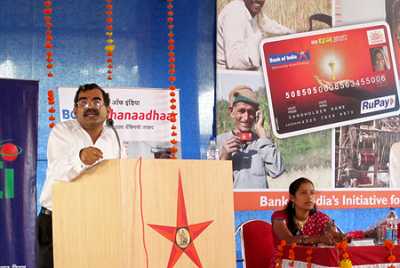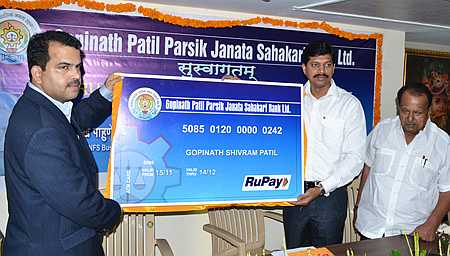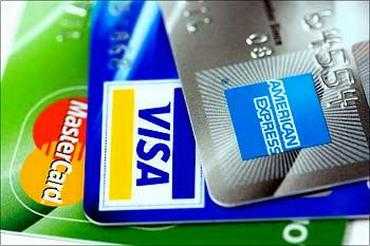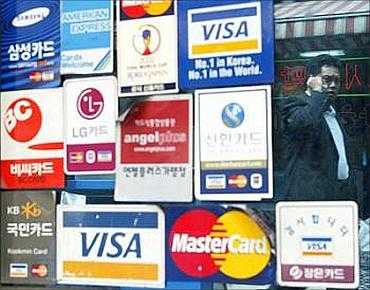
Move over Visa, MasterCard and American Express. Here's an indigenous, cheaper alternative that will not only benefit Indian banks but Indian who use debit cards and credit cards to make payments.
The Reserve Bank of India initiative, RuPay is a card-based payment system akin to Visa, MasterCard and American Express. The banking regulator got local banks to promote a not-for-profit National Payments Corporation of India (NPCI), the author of RuPay, which offers the same services offered by Visa and MasterCard, but at a much cheaper cost.
Click here for Rediff RealTime News on RuPay
Courtesy: Investment-mantra.in

Why RuPay?
RuPay is the Indian domestic card payment network being set up by NPCI at the behest of banks in India. This project had been conceived by Indian Banks Association and had the approval of Reserve Bank of India. The objectives to be fulfilled are:

How Indian banks will benefit
RuPay will compete with Visa and MasterCard in terms of cost and quality of service, and it is only natural to expect the incumbents also to reduce their rates. Banks have to pay Visa and MasterCard $50,000 (Rs25 lakh) as participation fee, whereas RuPay's services will be available at zero cost.
It is imperative for India to create a low-cost electronic payment system if the ongoing endeavour to overhaul the existing system of welfare payments and subsidies is to succeed.
The unique identity project will deliver a unique numerical tag for every Indian resident, which can then be used to create unique electronic bank accounts.

How customers will be benefitted?
Although shops will be the initial beneficiaries of lower debit card charges, it will ultimately benefit customers as it will make it viable for shops to accept card payments for even low-value transactions. Also low-margin businesses, which refused to accept cards because of charges of around 1.8 per cent at present, will be incentivised to accept card payments.
Debit card transactions are not charged in case of RuPay.
Since the cost for banks comes down, so the benefit will percolate to customers. The charges of Visa and MasterCard are substantially higher due to which costs one way or the other gets passed to the customers. The benefit will be passed on to the customers by way of reduced customer charges.

How Mastercard, Visa will be affected by RuPay?
Electronic Payment Market in India is huge. India has been one of the fastest growing countries for payment cards in the Asia-Pacific region.
According to the RBI, debit card transactions in India rose 49 per cent in January 2011 to reach Rs 37 billion (Rs 1 billion = Rs 100 crore; approximately $830 million) from about Rs 25 billion ($557 million) last year.
The number of debit cards in use also rose by 25 per cent during this period. Credit card transactions also rose 28 per cent in January 2011 compared to last year to about Rs 69 billion ($1.54 billion).

The number of transactions processed by MasterCard is likely to grow from 22.6 billion in 2010 to about 56.8 billion by 2018 at a compound annual growth rate of 14 per cent. Much of this growth will come from the Asia-Pacific region as consumers in this region are only beginning to embrace widespread use of electronic payment methods.
If an India payment system like RuPay gained popularity and other countries in the Asia-Pacific region decide to follow suit, MasterCard's number of transactions could only grow at a rate of lower rate than we forecast. In a scenario where the number of transactions processed by MasterCard would reach only 50 billion by the end of 2018 and will grow at a slower rate of around 12 per cent annually.

What will lure banks to RuPay?
It is cost effective. Banks have to pay less to the payment gateway provider. For example, banks have to pay nearly Rs 2 for a customer's transaction size of Rs 1,600 in RuPay network while the same is around Rs 2.80 with Visa or MasterCard.
Secondly, there is no entry fee for banks to enter RuPay network while lenders would have to pay around Rs 25 lakh each in case of other two providers.
Finally, banks need not pay a minimum quarterly fee in the RuPay network. However, the same fee would be in the range of Rs 10 to Rs 30 lakh for other two major payment gateways.
Moreover, RuPay helps in financial inclusion as many co-operative banks and regional rural banks (RRBs) are included in its network.

Banks are eying to buy stakes in the National Payment Corporation of India (NPCI), the nodal agency for the first-ever indigenous payment gateway – RuPay -- which charges less to banks as compared to other two payment gateways: Visa and MasterCard.
Currently, five more banks including Axis Bank, IDBI Bank, Central Bank of India, Standard Chartered Bank and Corporation Bank are looking to take ownership in the NPCI.
NPCI was incorporated as a Section 25 Company under the Companies Act. Hence, it is not bound to give any dividend or share of profit to its promoters. Rather, it has the mandate to re-deploy any gains back into the business.

Conclusion
Visa and Master Card have penetrated Indian market to an extent; it will take some time to undo their penetration. RuPay, of course, will create a new market for farmers, merchants in townships, and small businessmen, if they give some sops to their purchase.
Establishing a system similar to Visa and Master Card will take a while, and operationalising and scuttling issues related to fraudulent usages and all will certainly take a longer time than we think but definitely a step in the right direction.